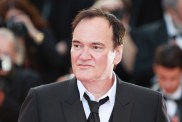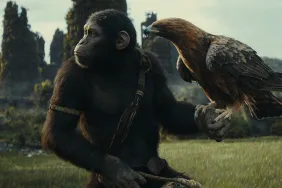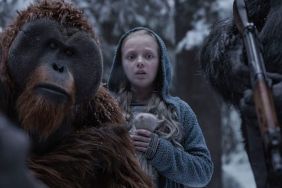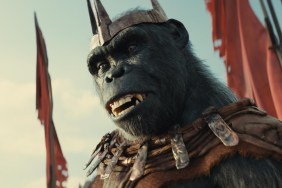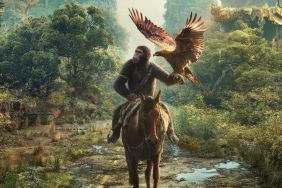Cast:
Andy Serkis as Caesar
Jason Clarke as Malcolm
Gary Oldman as Dreyfus
Keri Russell as Ellie
Toby Kebbell as Koba
Kodi Smit-McPhee as Alexander
Kirk Acevedo as Carver
Nick Thurston as Blue Eyes
Terry Notary as Rocket
Karin Konoval as Maurice
Judy Greer as Cornelia
Jon Eyez as Foster
Enrique Murciano as Kemp
Doc Shaw as Ash
Lee Ross as Grey
Directed by Matt Reeves
Story:
Ten years after the events of “Rise of the Planet of the Apes,” Caesar (Andy Serkis) and his fellow apes have set up camp and settled on the outskirts of San Francisco as the majority of the humans in the country have been wiped out by an unstoppable virus. The apes are living peacefully until a group of humans come upon their home hoping to reactivate a nearby dam to help bring power back to the city. While Caesar and some of the humans want to try to maintain peace and coexist, a number of incidents are seemingly building to war between the two factions.
Analysis:
Three years after the reboot of the popular sci-fi franchise with “Rise of the Planet of the Apes,” director Matt Reeves steps in with a chance to one-up that movie with a sequel that capitalizes on the earlier movie’s potential.
After an opening credits sequence showing how America has been affected by the virus released towards the end of the previous movie, we catch up with Caesar (Andy Serkis) and his extended ape family as they have formed a peaceful community in the woods outside of San Francisco. The only friction within the group is Koba (Toby Kebbell), a scarred human-hating chimp constantly questioning Caesar’s decisions as a leader, a situation exacerbated when humans arrive at their home and shoot one of their own. Instead of getting revenge, Caesar tries to maintain peace and allows the humans he still doesn’t trust to work on a nearby dam in order to generate power for their own community.
At first, the human characters, played by Jason Clarke, Gary Oldman, Kodi Smit-McPhee, Keri Russell and Kirk Acevedo, don’t add much to the mix, some of them feeling like outright stereotypes. When the focus of the film shifts to the human camp, it’s hard to retain as much interest, although some of the characters, particularly Clarke and Russell’s, do grow on you as they work closely to help Caesar and his family.
It’s abundantly clear from the very beginning that the apes are the true stars of the movie while the humans mostly act as casual antagonists, Oldman in particular, and it’s very hard to really take sides in this situation. Caesar’s lieutenant Koba becomes an instigator for war as he infiltrates the human armory and uncovers the vast amount of guns and other weapons they have in their possession, the ape’s primitive weapons being no match for guns.
Serkis and the performance capture cast bring such depth and emotion to the scenes between the apes and with the human characters that you quickly forget the apes are actually humans doing performance capture. (When Judy Greer and Toby Kebbell’s names were listed in the end credits, I couldn’t even recall where they appeared in the movie until I looked up the credits afterwards.)
What’s nice about “Dawn” is that while we still see foreshadowing glimpses of the future as seen in the original 1968 “Planet of the Apes”–humans being caged, for instance–the sequel doesn’t try to hit the viewer over the head with references to the original movies as “Rise” sometimes did.
The CG is absolutely phenomenal, the real highlight of the film as there are entire scenes that are almost entirely CG FX shots–such as the apes hunting down a deer to feed the community—but it all looks incredibly real and life-like you wouldn’t know it. The production design of the different environments is also quite exceptional, another thing that separates the sequel from the original, which was less fantastical. It’s fairly clear Matt Reeves has upped his game since “Cloverfield,” though he’s working with a much better concept, script and cast.
The film has a number of epic setpieces including a colossal battle sequence, but unlike the previous movie, it doesn’t leave things as a cliffhanger for another movie despite the fact that a third film is already being planned. Here’s hoping they’re able to create one of those rare infallible trilogies that never falters, like “The Lord of the Rings” or the original “Star Wars” trilogy. (We predict the third movie will either revive the title “Battle for the Planet of the Apes” or go with “War of the Planet of the Apes,” because that’s really the only way the story can go from here.)
The Bottom Line:
A brilliantly-realized successor to a solid franchise reboot, “Dawn of the Planet of the Apes” shows what can be done when a talented director with a strong script and cast creates a summer blockbuster that doesn’t feel the need to dumb itself down in order to succeed.
Dawn of the Planet of the Apes
-
Dawn of the Planet of the Apes

-
Dawn of the Planet of the Apes

-
Dawn of the Planet of the Apes

-
Dawn of the Planet of the Apes

-
Dawn of the Planet of the Apes

-
Dawn of the Planet of the Apes

-
Dawn of the Planet of the Apes

-
Dawn of the Planet of the Apes

-
Dawn of the Planet of the Apes

-
Dawn of the Planet of the Apes

-
Dawn of the Planet of the Apes

-
Dawn of the Planet of the Apes

-
Dawn of the Planet of the Apes

-
Dawn of the Planet of the Apes

-
Dawn of the Planet of the Apes

-
Dawn of the Planet of the Apes

-
Dawn of the Planet of the Apes

-
Dawn of the Planet of the Apes

-
Dawn of the Planet of the Apes

-
Dawn of the Planet of the Apes


